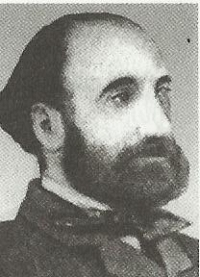French
culture played a very remarkable role in the development of Armenian
intellectual life in the nineteenth century. One of its best
representatives was journalist and writer Stepan Voskan (Voskanian).
Voskan
was born on December 14, 1825, in Smyrna (Izmir), the second city of
the Ottoman Empire, which would also become an important hub of Armenian
cultural life. He studied at the local Mesrobian School, where he
taught after graduation. In 1846 he went to Paris to continue his
studies. He was already well-versed in French and took some courses at
the Collège Sainte-Barbe, where he also tutored foreign students. At the
same time, he followed studies at the Conservatoire des Arts et Métiers
(for technical subjects) and the Collège de France (for liberal arts).
In 1847 he started contributing to the Parisian periodicals
National
and
Réforme,
and
took part in the French Revolution of 1848. The twenty-three year old
student was a speaker at the barricades, as well as an active
participant in the occupation of the royal palace: “Yes, we were with
those who rebelled against Louis Philippe,” he wrote in 1859, “yes, we
did what every man had to do for freedom and we had the honor of
entering the Tuileries arms in hand.” In June 1849 he participated in a
student protest against the war with Italy and, as a result, he was
arrested and spent two months in prison. Months later, he graduated from
Sainte-Barbe, and until 1852 he followed courses at the medical school
and the School of Social Sciences of the Sorbonne.
The
ideals of social justice and human rights, coupled with Auguste Comte’s
positivism, had forged Voskan’s world when he returned to the Ottoman
Empire in 1852. He settled first in Constantinople and then in Smyrna,
where he took a position as principal and teacher. He championed the
ideas of national awakening and education, as well as freedom, and was
an implacable critic of public affairs: “A moral and material wound must
be disclosed in order to be cured.” He published two pseudonymous
pamphlets (1853-1854), where he condemned retrograde clergymen and
Catholic mistaken views about the Armenian Church. He was persecuted and
lost his job; as a result, he returned to Paris, where he briefly
published the journal
Arevelk
(1855-1856). His views revealed controversial once again, and he lost the support of his wealthy sponsors.
After tutoring students for three years, Voskan published another journal,
Arevmudk,
in 1859, where he continued espousing his progressive views. After
Arevmudk
had to cease publication due to relentless opposition, he went to Italy. In Turin he was a contributor to the French newspaper
L’Italie
and
attracted the attention of the famous Italian statesman, Count of
Cavour (1810-1861), who had him tutoring his son from 1860-1861. Voskan
would later resume the publication of
Arevmudk
(1864-1865)
in Paris, again to meet a bitter end. Afterwards, he would abandon the
Armenian language as a medium of expression. Paradoxically, he had been a
champion of Modern Armenian and his writing and translations from
French had greatly contributed to its development.
The
journalist returned to his birthplace in 1866. He worked as principal
and French teacher at the Mesrobian and Hripsimian schools, and
published the French newspaper
La Réforme
(1867-1901).
He published two pamphlets in French in 1878-1879, where he criticized
the views of contemporary Armenian philosopher Kalust Gosdantian,
another follower of Comte, and French philosopher Émile Littré.
Little
is known about the last years of Stepan Voskan, who passed away in a
hotel in Smyrna on February 23, 1901, in dire straits. His views would
remain controversial even after his death. Nevertheless, many of them
have passed the test of time and are still relevant to this day.
